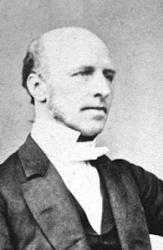
1810 - 1883 Person Name: Canon Thomas R. Birks Author of "The mighty God, the Lord hath spoken" in The Book of Common Praise Birks, Thomas Rawson, M.A., b. Sept. 1810, and educated at Trinity College, Cambridge (B.A. 1834, M.A. 1837), of which he subsequently became a Fellow. Having taken Holy Orders in 1837, he became Rector of Kelshall, Herts, 1844; Vicar of Holy Trinity, Cambridge, 1866; Hon. Canon of Ely Cathedral, 1871; and Professor of Moral Philosophy, Cambridge, 1872. He d. at Cambridge, July 21, 1883. His works, to the number of 25, include Biblical, Astronomical, Scientific, Prophetic, and other subjects. He also wrote the Memoirs of the Rev. E Bickersteth (his father-in-law), 2 vols., 1851. His hymns appeared in Bickersteth's Christian Psalmody; 1833; and, together with Versions of the Psalms, in his Companion Psalter, 1874. They number upwards of 100. [Eng. Psalters, § xx.] Very few are in common use in Great Britain, but in America their use is extending. They include:—
1. Except the Lord do build the house. Ps. cxxvii.
2. O come, let us sing to the Lord. Ps. xcv.
3. O King of Mercy, from Thy throne on high. Ps. lxxx.
4. O taste and see that He is good. Ps. xxxiv.
5. O when from all the ends of earth. Psj xiv.
6. The heavens declare Thy glory. Ps. xix.
7. The Lord Himself my Portion is. Ps. liii.
8. The mighty God, the Lord hath spoken. Ps. l.
9. Thou art gone up on high, O Christ, &c. Ps. xlvii.
10. Whom have I [we] Lord in heaven, but Thee. Ps. lxxiii.
Of these versions of the Psalms, all of which date from 1874, the most popular is No. 3. Mr. Birks' compositions are worthy of greater attention than they have hitherto received.
--John Julian, Dictionary of Hymnology (1907)
T. R. Birks


 My Starred Hymns
My Starred Hymns




